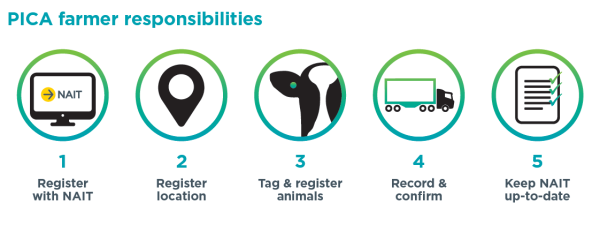Lifestyle farmers and pet owners
If you own cattle or deer — even if it's just 1 pet cow — you must register with NAIT and TBfree so we can trace your animals if there's a disease outbreak.
What you need to do
Register yourself, your location and your animals
Whether you have a whole herd of cattle or deer, or just 1 animal on your lifestyle block, you need to register:
- as a Person in Charge of Animals (PICA), and
- the location where your animals are kept.

All the cattle and deer at your property must have a NAIT ear tag and be registered in your NAIT account.
You also need to register for the TBfree programme which aims to eradicate bovine TB in New Zealand.
Keep your account up to date
After you've registered yourself, your location and your animals, you need to keep your NAIT account up to date by:
- recording any animal movements to or from your location within 48 hours of sending or receiving the animals
- ensuring your contact details are correct
- entering any new information about your animals — for example, recording cattle and deer that die or are home-killed on your lifestyle block.
If you sell your lifestyle block
If you move with your animals to another property and you're still their PICA, you need to:
- assign the NAIT location number of the new property to your animals, or
- register a new NAIT number for the new property and record a movement from the old NAIT number to the new one.
If you no longer have any cattle or deer, call us to find out how to deactivate your NAIT account.
Recording other animals or pets
If you register cattle or deer in NAIT, once a year you also need to declare other farm animals that can spread diseases such as Foot and Mouth. This includes pigs, goats, llamas, alpacas and sheep.
School pet days
If you send cattle or deer to a school pet day, it's a good idea to record a movement to the school and back to your property. Check with the school to find out if they have registered the event with NAIT.
Keeping dogs and other pets safe
If you're in a rural area your dogs or other pets may come into contact with poisons such as 1080 which is used to control the possum population. It's rare for this to happen, but usually fatal. There are things you can do to prevent your pets from ingesting 1080.
Downloads
Important information for lifestyle farmers
PDF 768 KB
Farmers and NAIT — a Pocket Guide
PDF 413 KB
Registering as a Person in Charge of Animals (PICA) education module
PDF 971 KB
Registering a NAIT location education module
PDF 1.5 MB
Tagging and registering cattle and deer education module
PDF 991 KB
Creating movements education module
PDF 767 KB
Keeping NAIT up to date education module
PDF 984 KB

